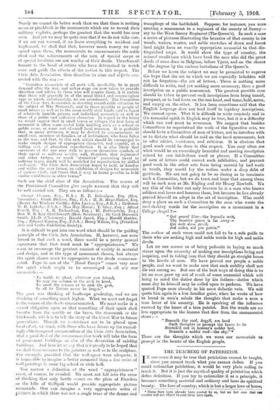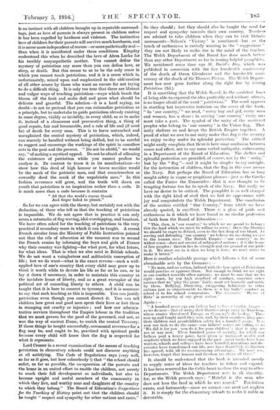THE TEACHING OF PATRIOTISM.
N one sense it may be true that patriotism cannot be taught, I since you cannot teach what you cannot define. If you could rationalize patriotism, it would be very plain sailing to teach it. But it is just the mystical quality of patriotism which defies definition. If you try to rationalize it as a principle, it becomes something material and ordinary and loses its spiritual beauty. The love of country, which is but a larger love of home,
• These lines baie already been quoted by us, but we feel sure that ow readers ylil not object to read thew once again.
is an instinct with all children brought up in reputable surround- ings, just as love of parents is always present in children unless it has been expelled by hardness and violence. The instinctive love of children for their parents will survive much harshness, and it is never more independent of reason—or more pathetically real— than when it is manifested under these conditions. Kingsley understood this when he described the love of Alton Locke for his terribly unsympathetic mother. You cannot define the mystery of patriotism any more than you can define love, or sleep, or death. But this seems tows to be the only sense in which you cannot teach patriotism, and it is a sense which is, unfortunately, seized upon and emphasized to the obliteration of all other senses by those who want an excuse for not trying to do a difficult thing. It is only too true that there are blatant and vulgar ways of teaching patriotism—ways which brush the bloom off the fruit and make dull and gross what should be delicate and graceful. The solution—it is a hard saying, no doubt—is not to pretend that you can rationalize patriotism as a principle, but to undertake to guide patriotism already existing in some degree, visibly or invisibly, in every child, so as to make it, instead of a clamorous and provocative thing, a thing of good repute, fair and honourable, and a rule of life and (if need be) of death for every man. This is to leave untouched and unexplained the central mystery of patriotism, which, indeed, can scarcely be handled without being defiled, but to be careful to suggest and encourage the workings of the spirit in countless acts in the past and the present. " Do not be afraid," we would say, " of making a mystical appeal. Do not be afraid of affirming the existence of patriotism while you cannot profess to analyse it. Be content to trace it in its manifestations—to show how this deed of high honour or brave sacrifice would be the mark of the patriotic man, and that conscienceless or cowardly deed the mark of the unpatriotic man." In this fashion reverence will grow, and the truth will dawn on youth that patriotism is an inspiration rather than a code. It is much more than a code because it contains
" All that the world's coarse thumb
And finger failed to plumb."
. So far we can agree with the theory, but certainly not with the deduction, of those who tell us that the teaching of patriotism is impossible. We do not agree that in practice it can only mean a saturnalia of flag-waving, idol-worshipping, and bombast. We have often asked for the teaching of patriotism in the very practical if secondary sense in which it can be taught. A recent French circular from the Ministry of Public Instruction pointed out that the role of education at the moment was to second the French armies by informing the boys and girls of France why their country was fighting—for what past, for what future, for what ideas. That is what we also need in British schools. We do not want a vainglorious and militaristio conception of life ; but we do want—what is the exact reverse—such a well- applied love of one's country that every child may grow -up to think it worth while to devote his life so far as he can, or to lay it down if necessary, in order to maintain this country as the inviolate home of liberty, and as a great exemplar of the political art of conceding liberty to others. A child can be taught that it is base to consent to tyranny, and it is nonsense to say that such teaching as this is impossible. You can justify patriotism even though you cannot dissect it. You can tell children how great and good men spent their lives or lost them in stamping out cruelty or injustice ; and how our adminis- trative services throughout the Empire labour in the tradition that we must govern for the good of the governed, and not, as was the way of ancient Rome, to enrich the central Treasury. If those things be taught successfully, ceremonial reverence for a flag may be, and ought to be, practised with spiritual profit because every child will know that the flag is respected for what it represents.
Lord Cromer in a recent examination of the means of teaching patriotism in elementary schools could not discover anything at all satisfying. The Code of Regulations says (very well, so far as it goes, but how colourlessly !) that " the school should enlist, as far as possible, the co-operation of the parents and the home in an united effort to enable the children, not merely to reach their full development as individuals, but also to become upright and useful members of the community in which they live, and worthy sons and daughters of the country to which they belong." The Board of Education's Suggestions for the Teaching of History point out that the children should be taught " respect and sympathy for other nations and races."
So they should ; but they should also he taught the need foe respect and sympathy towards their own country. Teacher' are advised to take children when they can to visit historic
monuments—Nelson's Victory ' is mentioned—but as the touch of enthusiasm is entirely wanting in the " suggestions; " they are not likely to strike fire in the mind of the teacher.
The Welsh Department of the Board has done much bettec than any other Department so far in issuing helpful pamphlets. We mentioned some time ago St. David's Day, which, was published in connexion with the five hundredth anniversary of the death of Owen Glendower and the hundredth anni-
versary of the death of Sir Thomas Picton. The Welsh Depart- ment has now gone further along the right line by issuing
Patriotism (3d.).
It is something that the Welsh Board, in the confident hops
of being able to expound the idea profitably and without offence, is no longer afraid of the word " patriotism." The word appears
in startling but impressive isolation on the cover of the book. " In ' our country,' " we read, " every boy and girl, every matt and woman, has a share : in- serving ' our country ' every ona must take a part. The symbol of the unity of the scattered
peoples who belong to ' our country' is the Union flag. That unity shelters us and keeps the British Empire together. A proof of what we owe to our unity under that flag is the security wo enjoy to-day under its splendid protection." The criiicat
might easily complain that there is here some confusion between cause and effect, not to say some verbal ambiguity, unbecoming in a Department of the Board of Education. The shelter and splendid protection arc provided, of course, not by the " unity," but by the " flag "—and it might be simpler to say outright.
for the instruction of children, that the flag in this ease Means the Navy. But perhaps the Board of Education has so long
sought safety in vague or propitious phrases--just as the Creeks called the Furies the Eumenides—that it was thought to be tempting fortune too far to speak of the Navy. But really we have no desire to be critical. The pamphlet is so well charged with the right kind of stuff that we hail its appearance with joy and congratulate the Welsh Department. The eonclusion
of the section entitled " Our Country," from which we have already quoted, is excellent. There is a glow of pride and enthusiasm in it which we have found in no similar profession of faith from the Board of Education
" This, then, is ' our country,' to which we are proud to belong ; this the land which we must be willing to serve : these the liberties we should be eager.to defend, even to the last drop of our blood. In serving and defending our country' we believe we arc doing service the human race. The British Empire—` our country, in its widest sense—does not consist, of subjugated nations ; it is the holme of free peoples : therein lies its strength and the ground of our pride in it. We must see to it that wo keep it free : we intik, strive to make it better."
Hero is another admirable passage which follows a list of some abominable acts by the Germans —
" No man, and no nation, imbued with the true spirit of Patriotism would practise or approve them. Not enough to think we are right in our conduct towards other nations : we must be sure that we do right—must, by our high standard of conduct, convince other nations that we play the game ' fairly, must act honestly and nobly by them. Bullying, blustering, swaggering behaviour to other nations just as objectionable to them as a big bully's conduct ice school is to his school companions. The Germans" Hymn of Hate' is unworthy of any great nation."
Again :—
" A hundred years ago our fathers bad- to free a terrible :longer — as we do now—that of seeing their liberties swept away by NapiAeon. whose armies threatened Europa as (11.itinllly's! (10 to-day. Thee rose up and fought until they won. and, by their sacrifices, they gar,t their children and grandchildren safety for a hut:dead years. it it now our task to do the same—our fathers' voices are calling to 114 ' We did it for you--you do it for your children' : that is why we are at war now. These hundred years of security, for which ace fathers paid a heavy price, have given in increased wealth and comforts which we have enjoyed in the past--great books have born written, schools and colleges have been founded, inventions and dis- coveries have transformed our life, arts have flourished. civilization has spread, with all its accompanyint! advantages. We must not, however, forget that honour and freedom arc above all these."
It should be understood that the boo!: is intended merely to supply notes of ideas for teachers to follow and expand. It has been reserved for the Celtic heart to show the way to.other Departments. The Welsh Department. nets in all sincerity, for, as the Welsh proverb says : " Hateful is the man who does not love the land in which he was reared." Patriotism exists, and fortunately—since we cannot—we need not explain it. It is simply for the elementary schools to make it noble or
detestable.



































 Previous page
Previous page